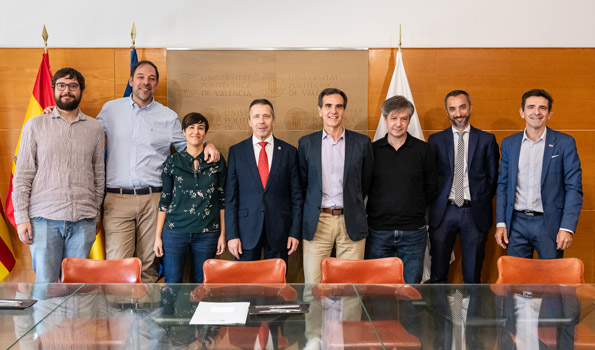Colibri Biomed, new UPV spin-off
Driven by researchers from the Universitat Politècnica de València's ai2 Institute, Colibri BIOMED seeks to improve the quality of life for people with type 1 diabetes.
[ 12/11/2025 ]
The Universitat Politècnica de València (UPV) adds a new spin-off to its entrepreneurial and innovative ecosystem. Colibri Biomed is a pioneering company in Europe, with a primary objective of enhancing the quality of life and well-being of people with diabetes.
To this end, Colibri Biomed is working on the development of a fully automated insulin pump that simplifies the daily routines of people with type 1 diabetes. The current systems on the market require a lot of intervention from the patient throughout the day - when eating, during exercise, etc.
"With this new insulin pump, our goal is for people with diabetes to largely forget about their condition, freeing them from the mental pressure of the many decisions they need to make throughout the day, even if they currently use automatic insulin infusion systems. We want patients to intervene only to the extent they wish, finding the right balance between glycaemic control and quality of life. Our system is designed to work like plug & play: you put it on and the system pumps insulin as needed, with no information other than glucose measurements," says José Luis Díez, CTO of Colibri Biomed and researcher at UPV's ai2 Institute.
In addition, the system developed by Colibri Biomed also stands out for a safety feature that no other device on the market offers, which prevents failures that can cause insulin blockages. 'Our goal is to make life as easy as possible for people with diabetes in the safest way possible,' emphasises José Luis Díez.
How it works
Colibri Biomed's insulin pump is based on a patented control algorithm, enabling a fully automated insulin delivery system. This algorithm automates insulin dosing in real-time based on glucose readings, eliminating the need for manual intervention, even during meals and physical activity.
‘This means that patients do not have to estimate the carbohydrates in each meal or report physical activity. To make insulin delivery control safer, a new sensor detects any obstruction or anomaly in the system's flow, thus optimising therapy and treatment,’ adds Jorge Bondia, CSO of Colibri Biomed and also a researcher at ai2 UPV.
The launch of this new spin-off is the result of more than 25 years of research by a group from the UPV's ai2 Institute, led by José Luis Díez and Jorge Bondia, as well as the Prisma project, funded by the Horizon Europe – EIC Transition Open programme, in which ai2-UPV researchers also participated.
Alongside the researchers from ai2 UPV, Colibri Biomed also includes a team of experts from the start-up builder Day One SRL (Italy), former partners in the Prisma project, in particular Paolo De Stefanis (CEO), Guido Panfili, Agnese Denzi and Leonardo Molinari, who will contribute their extensive business experience to Colibri Biomed.
The rector of the UPV, José E. Capilla, emphasised that this new company ‘demonstrates the enormous impact that science can have when applied to the service of people. At the UPV, we conduct research to transform knowledge into well-being, and Colibri Biomed is a clear example of how university innovation can improve the lives of millions of patients around the world.’
Capilla also underlined the importance of spin-offs as vehicles for technology transfer and drivers of social change: ‘Our commitment is to continue supporting scientific entrepreneurship from the university. Each new company born from our laboratories represents an opportunity to create value, employment and real solutions that bring science closer to society.’
With Colibri Biomed, the UPV now has 31 active spin-offs, 23 of which have direct institutional participation. This growth consolidates the university as a national benchmark in scientific entrepreneurship. It reinforces its model of knowledge transfer to the productive fabric, based on research excellence and collaboration with technology companies.
Outstanding news
 Study a degree at the best technological university in Spain
Study a degree at the best technological university in Spain
The Universitat Politècnica de València is ranked number 1 among Spanish technology universities, according to the Shanghai ranking
 National Research Award
National Research Award
Ramón Martínez Máñez has received the "Juan de la Cierva" National Research Award in the area of Knowledge Transfer
 The UPV and Beihang University strengthen their academic and scientific alliance
The UPV and Beihang University strengthen their academic and scientific alliance
The two universities have signed a new collaboration agreement as part of the celebration of "UPV Day" in China
 Study in English
Study in English
The UPV offers eight degrees, 16 master's and 650 courses in English for the 2025-26 academic year
 THE Impact Ranking
THE Impact Ranking
The UPV, the Spanish university with the greatest social and economic impact in the world






